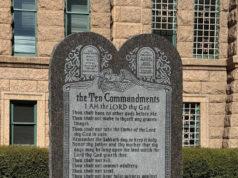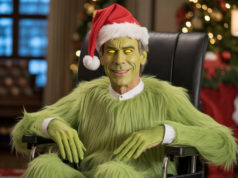Fort Worth Weekly writer and musician Jeff Prince got a standing ovation at the Mayborn Literary Nonfiction Conference on Saturday in Grapevine after he gave a presentation explaining how he uses songwriting techniques in news and feature stories. He was in heady company: The annual conference, hosted by the Mayborn School of Journalism at the University of North Texas, also draws big-name authors as speakers.
“Rhythm, meter, and even rhyme can be used in news stories,” Prince told the crowd of 300 authors, journalists, and students. “One of the first news articles I ever wrote involved a peeping tom in a tan coat, and included the sentence, ‘The man in tan ran.’ ” To illustrate finding new perspectives, he sang a song written from the point of view of a cockroach — and then described a sports profile he once wrote about a teenage girl who finished last in every race she ran. Static’s sources said other participants were quoting Princisms all weekend, including, “Write like nobody is going to read it.” Acclaimed sportswriter Gary Smith of Sports Illustrated said Prince’s lecture with live music was his favorite presentation of the weekend; a top editor at The Dallas Morning News agreed.
“Aw hell, it weren’t nuthin’,” said the ever-humble Prince, while chillaxing in his cubicle, chomping on peeled grapes being fed to him by interns. Weekly editors have turned down his request that his byline be changed to “the writer formerly known as Prince.”
Special-ly Peeved
Fort Worth city staffers have made some minor changes to the proposed special events ordinance that has caused so much fuss — but not nearly enough to satisfy neighborhood leaders. They’re still so opposed that, at a public hearing before the city council on Tuesday, they asked that the entire section of the ordinance dealing with neighborhood events be pulled.
“They are treating having a parade in a neighborhood like a big nonprofit fundraiser, and these neighborhood events are nothing like that,” said Libby Willis, president of the Fort Worth League of Neighborhoods. Willis also complained about how the ordinance was crafted: Only one of 10 members of the council-appointed committee that drew it up represented neighborhood associations; the rest were downtown business and chamber of commerce types.
“It was drafted without any real input from neighborhoods, and we have the experience where we could have advised them on what would help and what would hurt us,” Willis said. “We are the ones affected most, and they didn’t even let us in on the process. The biggest potential consequence of this proposed ordinance is that it may cause a wide variety and number of neighborhood events to disappear.”
The ordinance sets up lots of hurdles for those kinds of events: sizable security deposits to be paid, appearances before two city-appointed committees for approval, heightened security, and a requirement for petitions signed by anyone who lives nearby. Of course, events that cause truly major hassles, like the Main Street Arts Festival, the stock show, and anything at the Texas Motor Speedway, would be exempt.
The next public hearing on the proposal will be at the Aug. 3 council meeting, after which it is expected to be put to a vote. Willis predicts it will pass as is. “We asked to take these neighborhood events out, but they haven’t listened to us before, so I doubt they’ll do it now,” she said.











